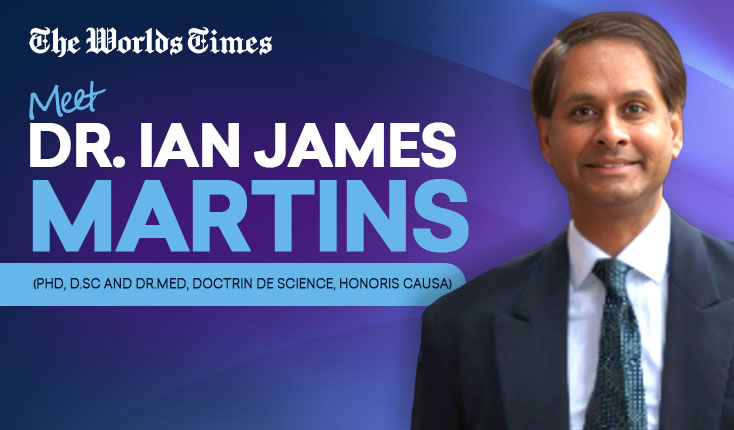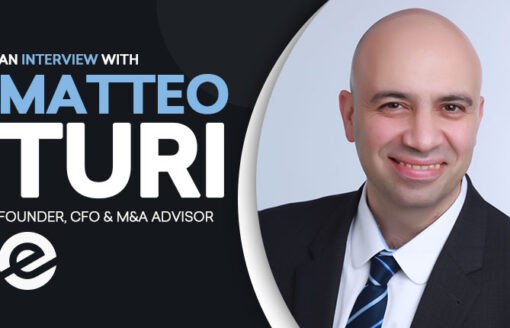Dr. Ian James Martins Interview
In this exclusive interview with The Worlds Times, Nobel Research Award laureate Dr. Martins reflects on the pivotal milestones of his career in endocrinology, metabolism, and nutrition. He shares insights into his groundbreaking research on Sirtuin 1, its role in aging, diabetes, and COVID-19, and the global impact of poor nutrition and bacterial toxins. Dr. Martins also discusses the evolution of scientific publishing, the importance of peer review, and his vision for the future of personalized medicine and integrative research.
A Lifelong Pursuit
We started the interview by asking, “Dr. Martins, could you share the key milestones in your journey that led to receiving the Nobel Research Award in 2024?”
Dr. Ian James Martins replied, “Receiving the Nobel Research Award in 2024 was a culmination of decades dedicated to research in endocrinology and metabolism. My early work focused on the intricate mechanisms of diabetes and nutrition, leading to significant findings that have been widely published. Serving as an editor and reviewer for esteemed journals allowed me to stay at the forefront of scientific discourse. Additionally, my involvement with international research organizations provided platforms to influence global research standards.”
Connecting the Dots in Health Science
The Worlds Times: Your contributions span endocrinology, metabolism, diabetes, and nutrition. What drives your passion across these diverse fields?
Dr. Ian James Martins replied, “The interconnectedness of these disciplines fascinates me. Understanding how metabolic processes influence endocrine functions and how nutrition impacts both is crucial for developing holistic healthcare approaches. This integrated perspective drives my research, aiming to uncover insights that can translate into comprehensive treatment strategies for metabolic disorders.”
Shaping the Future of Knowledge
The Worlds Times: As an editor and reviewer for various journals, how do you perceive the evolution of scientific publishing in your areas of expertise?
Dr. Ian James Martins replied, “Scientific publishing has undergone significant transformations, especially with the rise of open-access platforms. This shift has democratized information, allowing for broader dissemination of research findings. However, it also necessitates rigorous peer-review processes to maintain quality. My editorial roles have reinforced the importance of upholding high standards to ensure that published research contributes meaningfully to the scientific community.”
Milestones That Mattered
The Worlds Times: The ABCD Wall Life Journey video highlights significant moments in your career. Could you elaborate on how these experiences have shaped your research focus?
Dr. Ian James Martins replied, “The video encapsulates pivotal experiences that have defined my career trajectory. Each milestone, from early academic pursuits to collaborative research projects, has reinforced my commitment to addressing complex health issues through multidisciplinary approaches. These experiences have honed my focus on translational research, aiming to bridge the gap between laboratory findings and clinical applications.”
Bridging Science and Medicine
The Worlds Times: With honorary degrees in both science and medicine, how do you integrate these perspectives into your research endeavors?
Dr. Ian James Martins replied, “Holding honorary degrees in science and medicine allows me to approach research questions with a comprehensive lens. It enables me to consider both the fundamental scientific mechanisms and their clinical implications. This integration is vital for developing interventions that are not only theoretically sound but also practically effective in medical settings.”
Upholding Scientific Rigor
The Worlds Times: Your recognition as a top peer reviewer underscores your commitment to scientific integrity. What advice would you offer to emerging researchers striving for excellence in peer review?
Dr. Ian James Martins replied, “Peer review is the cornerstone of scientific integrity. For emerging researchers, I recommend approaching each review with meticulous attention to detail and a constructive mindset. It’s essential to stay updated with current methodologies and ethical standards. Providing insightful, unbiased feedback not only enhances the quality of published research but also contributes to one’s development as a critical thinker in the scientific community.”
Pioneering the Future
The Worlds Times: How do you foresee the future of research in endocrinology and metabolism, and what areas do you believe require immediate attention?
Dr. Ian James Martins replied, “The future of research in endocrinology and metabolism lies in personalized medicine and the integration of omics technologies. Immediate attention is needed in understanding the genetic and environmental interactions that contribute to metabolic disorders. Additionally, exploring the microbiome’s role in endocrine functions presents a promising frontier that could unveil novel therapeutic targets.”
Mastering the Art of Balance
The Worlds Times: Balancing multiple roles across research, editorial duties, and advisory positions can be demanding. How do you manage these responsibilities while maintaining a focus on impactful research?
Dr. Ian James Martins replied, “Effective time management and a clear prioritization of tasks are crucial. I allocate dedicated time blocks for research, editorial duties, and advisory roles, ensuring that each responsibility receives the attention it deserves. Collaborating with competent teams and delegating tasks when appropriate also helps in maintaining a balance. Ultimately, staying passionate about the work and its potential impact keeps me motivated to manage these roles effectively.”
The Silent Guardian
The Worlds Times: Your research on Sirtuin 1 has highlighted its importance in aging, diabetes, and Alzheimer’s disease. Could you elaborate on how this gene functions and why it is critical for human health?
Dr. Ian James Martins replied, “Sirtuin 1 (SIRT1) is a longevity-associated gene that plays a crucial role in cellular repair, metabolic regulation, and neuroprotection. It functions as a deacetylase, modulating key proteins involved in inflammation, oxidative stress, and energy metabolism. SIRT1 enhances insulin sensitivity, making it highly relevant in diabetes management, while its neuroprotective effects help slow down Alzheimer’s disease progression. Unfortunately, factors such as poor diet, chronic inflammation, and aging reduce SIRT1 activity, increasing susceptibility to metabolic and neurodegenerative disorders. Identifying nutritional and pharmacological activators of SIRT1 is an important area of my research, as it offers a promising approach to extending healthspan and delaying disease onset.”
Unveiling the Hidden Link
The Worlds Times: In your studies, you have linked food quality, bacterial lipopolysaccharides, and chronic disease. How do these factors interact to influence global health?
Dr. Ian James Martins replied, “Food quality is a major determinant of health, not just in terms of macronutrients and vitamins but also regarding contamination with bacterial lipopolysaccharides (LPS). LPS are endotoxins derived from gut microbiota and processed foods that can trigger systemic inflammation, insulin resistance, and neurodegeneration. High levels of LPS have been implicated in diabetes, obesity, cardiovascular diseases, and even Alzheimer’s disease. The disruption of gut microbiota due to poor diet leads to increased intestinal permeability, allowing LPS to enter the bloodstream and contribute to chronic disease progression. My research emphasizes the need for better dietary practices and the development of nutritional strategies that can activate SIRT1 while reducing LPS-related inflammation.”
From Infection to Recovery
Lastly we asked, “You have explored the relationship between Sirtuin 1 and COVID-19. How does this gene impact viral infections and long-term complications related to the pandemic?”
“SIRT1 plays a significant role in immune function and cellular resilience against infections, including viral diseases like COVID-19. During infections, the body experiences heightened inflammation and metabolic stress, which can suppress SIRT1 activity. This suppression has been observed in patients with severe COVID-19, where inflammation and immune dysregulation contribute to complications such as long COVID, organ damage, and neurological symptoms. Enhancing SIRT1 activity through nutritional interventions, lifestyle modifications, and potential pharmacological approaches could not only improve immune response against infections but also mitigate long-term complications of COVID-19. Understanding this connection is essential in preventing the next wave of chronic diseases following the pandemic.” Dr. Ian James Martins Concluded
Watch Dr. Ian James Martins’s journey on YouTube
ABCD WaLL & Scientific Laurels
Also Read:
Murali Krishna Chemuturi’s Life and Legacy
Dr. George Syrmalis: Bridging Innovation
Michael Doherty, Guiding you through the Complexities





























































